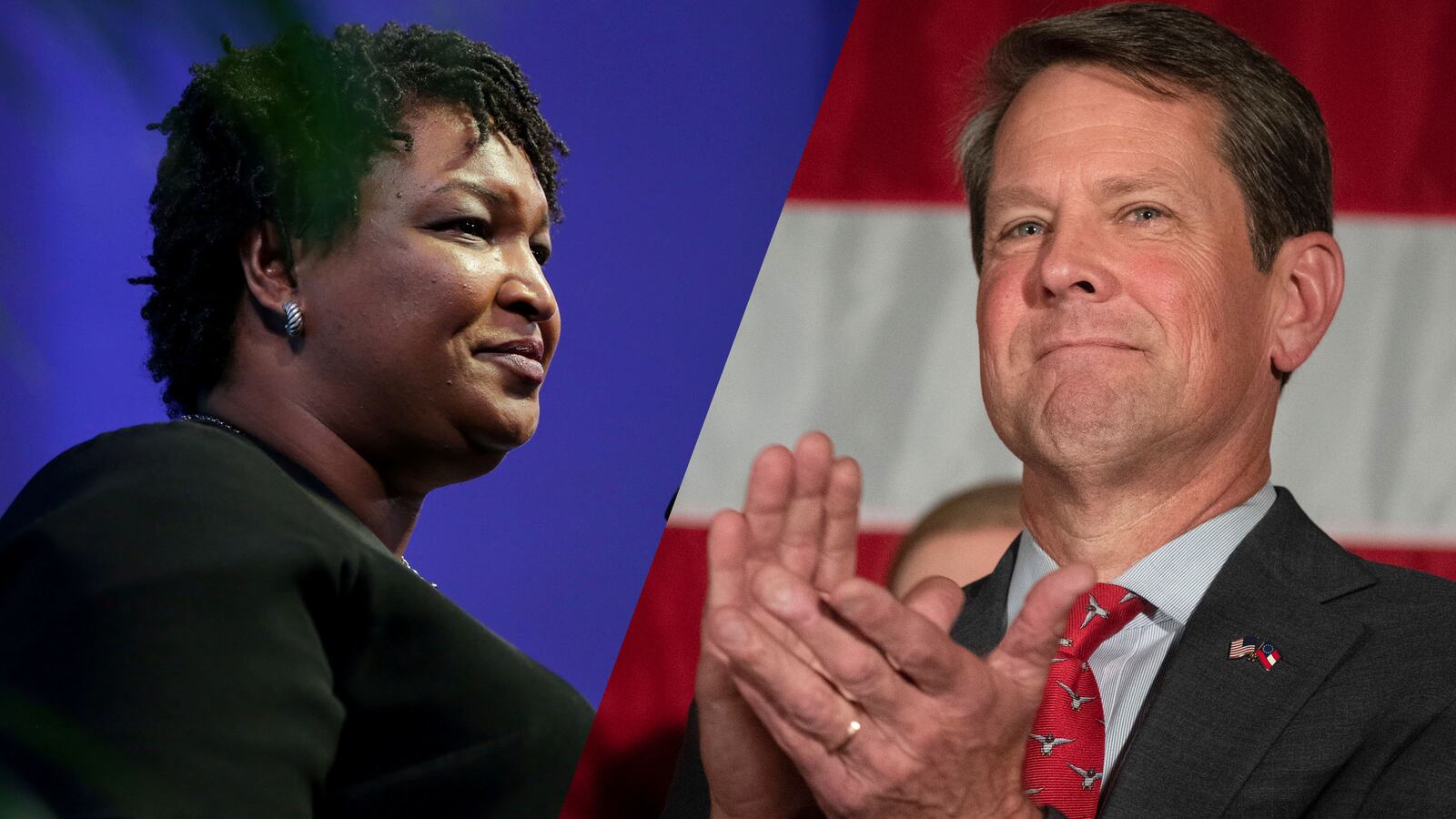BIBB COUNTY, Georgia—The election between Republican Brian Kemp and Democrat Stacey Abrams in the increasingly bitter Georgia governor’s race was always going to come down to voting rights. For nearly a decade, the two have clashed over that historical and emotionally-charged issue, with Kemp overseeing elections as Georgia’s secretary of state and Abrams, Georgia’s most powerful black lawmaker, running a nonprofit to register more minority voters for state elections.
In the past, Kemp has accused Abrams of criminal voter fraud, while Abrams has called Kemp’s role in elections nothing short of brazen voter suppression.
But now the stakes are even higher. The two are locked in a statistically tied race for governor, and an AP report recently revealed that 53,000 Georgia voter registrations are on hold under the state’s new “exact match” standard, which Kemp championed through the Georgia legislature in 2017. The report estimated that 80 percent of the pending applications belong to people of color.
With Election Day nearing, the law has become the topic of intense debate, both in the courtrooms and on the airwaves. On the ground in the state, the impact as been more psychological. An increasing number of voters in Georgia, especially minorities, are becoming convinced that the election could be rigged.
“Everybody I speak to says, ‘I’m voting but why?'” said Rev. Mildred Holmes-Denson, a Methodist pastor in Macon. “Even if Stacey wins, do you know Kemp’s in control of it? Can it be fair when he’s her opponent and says, “This one can vote. That one can’t vote.” How can it be fair when he’s there to suppress any vote he wants?”
In a windowless back room of a Democratic Party field office in middle Georgia earlier this week, Holmes-Denson along with other volunteers manning the phones said questions about voter suppression, including those 53,000 applications, have come up in nearly every call. The fears are being fed by the fact that Kemp has rejected calls to resign as secretary of state before the November election—allowing him to serve as both a candidate and the top official overseeing the election itself.
On the wall in the office is a sheet of butcher paper hanging behind the volunteers with the number of the Voter Protection Hotline, a toll-free phone bank manned by 180 trained volunteers and overseen by a full-time voter protection director at the Georgia Democratic Party. Elaine Morgan Johnson, a retired bank vice president, said she’s also heard concerns about voter security. “Some people told me they’re doing absentee ballots because they want a paper trail,” she said.
Another volunteer said she’s talked to people planning to vote in person because they didn’t trust the post office to deliver their ballots.
Vivian Hallmark, a retired teacher in Bibb County, said the fight over who can and cannot vote in Georgia has become a proxy debate for whether the state is moving forward or staying stuck in the past. That’s especially true for older Georgians who were sent to all-black schools, told they couldn’t vote, or were kept out of jobs and careers because of the color of their skin. For them, the current debate over voting rights is a different variation of the same old tune.
“That’s what we’re fighting for,” Hallmark said. “We don’t want to go back to all that.”
After about an hour of phone calls, Hallmark gathered her clipboard and voter lists and headed out to knock on doors in Macon’s predominantly black neighborhoods She left door hangers at empty houses and talked about early voting and Medicaid expansion to anyone who said hello, even through a closed door. Voter suppression came up at the third home.
“Kemp’s in charge—isn’t that a conflict of interest? That’s ridiculous,” said Frank Phinazee, a member of the Seminole nation who stood in the doorway of his simple frame house. “I get a funny feeling about the 53,000 votes. They might tamper with them.”
Neither the Georgia secretary of state’s office, the Kemp campaign, nor Rep. Barry Fleming—the GOP sponsor of the exact match legislation—returned calls for this story. But Georgia state Sen. Elena Parent, a Democrat from Atlanta who voted against the bill, said she’s not shocked that thousands of minorities could be blocked from voting this year.
“This is exactly what we expected,” she said.
Parent said civil rights groups warned for years that the law would disproportionately affect African Americans with unique names, women who change their names after marriage or divorce, and Asian American and Hispanic Americans whose names are often listed incorrectly on government documents.
“We’ve launched a robust voter protection program, but it’s a shame that it’s even necessary,” Parent said. “The more roadblocks you put up, the more you will stop these folks from voting.”
One of the Georgians facing those roadblocks is Vanessa Alva, a 21-year-old college student at Mercer University who became a U.S. citizen earlier this year. Three weeks after her swearing-in ceremony, Alva also registered to vote. But last week, she received a letter from the Gwinnett County Deputy Registrar’s office telling her that while they “appreciate her interest in exercising her privilege to vote,” her absentee ballot application had been rejected. A quick check of the secretary of state’s website showed that Alba’s is one of the 53,000 pending applications.
Although she has called the secretary of state’s office, a county office, and the Democrats’ voter protection hotline, she’s still not registered to vote. “I still don’t really know what the process is or what’s wrong,” she said.
Alva plans to request a provisional ballot to vote, and has a valid Georgia drivers license to use as a photo ID. But whether her vote will count or not will be at the discretion of a poll worker in Gwinnett County, with the result ultimately certified by Brian Kemp’s office.
“If you ask me on the day after the election if I’m confident that all of the votes have been tabulated correctly, I’d have to say not really,” said Parent.






